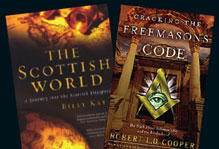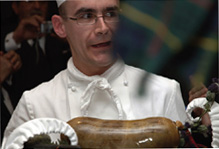He was one of the leading figures of the Scottish Enlightenment, an eccentric Court of Session judge whose theories about the relationship between humans and primates predated Charles Darwin by almost 100 years.
But the contribution of Lord Monboddo to philosophy and science in the 18th century has been largely forgotten — until now.
The life and times of the noted scholar, linguist and philosopher is to be celebrated in a new musical, created by one of his kinsmen, James Burnett of Leys, Chief of the Burnetts, whose ancestral home at Crathes Castle in Aberdeenshire is now owned by the National Trust for Scotland.
The imposing 16th century castle near Banchory was yesterday used as the backdrop of the official launch for the new musical Monboddo, which is to be premiered next month at the Aberdeen Arts Centre.
The musical charts Lord Monboddo's investigation of human evolution a century before Darwin's Origin of Species was published, and his belief that the orang-utan should be recognised as human.
It also tells the poignant tale of his daughter Eliza, a noted beauty, whose romance with the poet Robert Burns was cut tragically short by her death from consumption at the age of 25.
Mr Burnett, who is not a direct descendant of Lord Monboddo, said a celebration of the once famous Scot was long overdue.
He said: "Monboddo was a passionate man, a man of great belief and courage, whose revolutionary thinking was ahead of its time and whose story is one of Scotland's great tales. He is largely overlooked but you can easily see that Darwin would have been inspired with his theories.
"He is a much more important figure than he is given credit for. He is too great a figure not to be known about."
Mr Burnett said he developed the concept for a film when writing a short article on Lord Monboddo. The focus switched to a stage show because of the complications of film funding and the wish to hold on to editorial control.
"The story has everything - drama, romance, beauty, creative thought, and some great, famous, colourful and eccentric characters, all set against the backdrop of the Scottish Enlightenment, arguably the greatest period of our history," he said.
"It was said generations ago that Monboddo was the greatest Scot about whom a biography had not been written.
"He was certainly amongst the most eccentric, and though that has since been corrected, so much of the story remains untold."
Lord Monboddo, who died aged 84 in 1799, was one of a number of scholars involved in the development of the early concepts on evolution.
He has been credited by many with being the first to raise the idea of natural selection.
Widowed at an early age, Monboddo had three children. When Eliza, his youngest daughter, died aged 25, Burns wrote the poem Elegy on the late Miss Burnet of Monboddo as a lasting tribute to her.
The musical is being brought to the stage by Blitz Entertainment International, a theatre, music and events company based at Newtonhill in Aberdeenshire.
The role of Lord Monboddo is being played by Muzz Crandon, the company's artistic and music director.
He said: "Monboddo's tale is an inspiring one — he was a character with so much to offer, from the love he had for his family, to his skills as a linguist, philosopher and judge, which were to have a real impact on Scottish society."
Mr Crandon added: "Our show is a musical in every sense of the word, with bold, colourful characters bringing to life a selection of ten original songs which touch on love, loss, belief, science and of course some comedy to lighten the mood.
"It's in the tradition of the best the West End has produced, and we are all really proud to have the opportunity to be part of its world premiere.
"We all really believe in the show, and that it will touch audiences the way the story has touched generations of Burnetts."
The musical will be premiered on Wednesday, 8 September at Aberdeen Arts Centre and will run until 11 September.
Life of a forgotten eccentric:
Lord Monboddo was born James Burnett in 1714, at his family's home, Monboddo House in Kincardineshire. After studying at Edinburgh University and the University of Groningen he was admitted to the Faculty of Advocates in 1737 and later became a judge at the Court of Session.
A celebrated eccentric, he refused to sit on the bench with his fellow judges but sat below with the court clerks, after his colleagues went against him in a case involving the value of a horse.
In 1773, he published Of the Origin and Progress of Language, in which he expounded his theories that man was derived from animals and that orang-utans were related to humans. He organised "learned suppers" at his Edinburgh home, inviting the likes of Robert Burns, Samuel Johnson and James Boswell.
10 August 2010
By Frank Urquhart
The Scotsman



